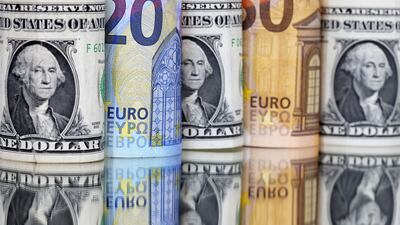The euro is expected to continue its decline against the US dollar after plunging below parity, said the Institute of International Finance.
The single currency, which came into physical circulation in 2002, fell to below parity against the greenback on August 22 and to a low of $0.9910 the next day. It ended trading on Friday at 0.9957.
The euro first fell to below parity in July and has continued to trade below or near parity for the past two weeks. It has dropped more than 12 per cent against the dollar this year, dragged down by historically high inflation and low consumer confidence.
Annual inflation in the euro area reached 9.1 per cent last month, from 8.9 per cent in July, a record high, as energy costs remain elevated and food prices continue to accelerate, according to flash figures from Europe’s statistics office Eurostat.
Energy recorded the highest annual inflation rate at 38.3 per cent while food, alcohol and tobacco were up 10.6 per cent.
Inflation is a major concern for the European Central Bank, which increased interest rates by 50 basis points to zero on July 21 — its first rate increase in 11 years. The ECB is expected to increase rates by a similar or greater amount on September 8.
“Markets are increasingly focused on recession, however, and we think — if the ECB does choose to hike 75 bps in September — they may look through ECB tightening and switch to pricing policy rate cuts further out, much as they have been doing for the Fed,” the IIF said.
“As a result, it is unlikely that ECB hiking will prevent the euro from falling further, not least since speculative positioning remains close to flat for the single currency. The euro is therefore likely to keep falling.”
The ECB is behind the inflation curve and playing catch up, critics said as they cited weak economic indicators.
On Thursday, the latest data showed that Germany's manufacturing sector remained in contraction territory in August, with the S&P Global/BME purchasing manager's index falling to 49.1, from 49.3 in July, due to a decline in factory activity in Europe's biggest economy caused by a sharp decline in new orders.
European surveys offer “little hope that the bloc will avoid a recession later this year”, said Craig Erlam, a senior market analyst at Oanda.
“And that is before winter even starts and energy bills go through the roof. It is going to be a long, hard six months for Europe and it can't rely on the ECB to provide any relief — quite the opposite actually.”
The eurozone area is unlikely to avoid a recession, given the deterioration in economic indicators, with growth estimated at 1 per cent in 2022, the IIF said.
It said the sharp deterioration in the eurozone trade balance reflected the immediate hit from the large rise in energy prices, and that the bloc's reliance on cheap Russian energy required “a retooling of the eurozone growth model, [which] will take time and weigh on growth in coming years”.


